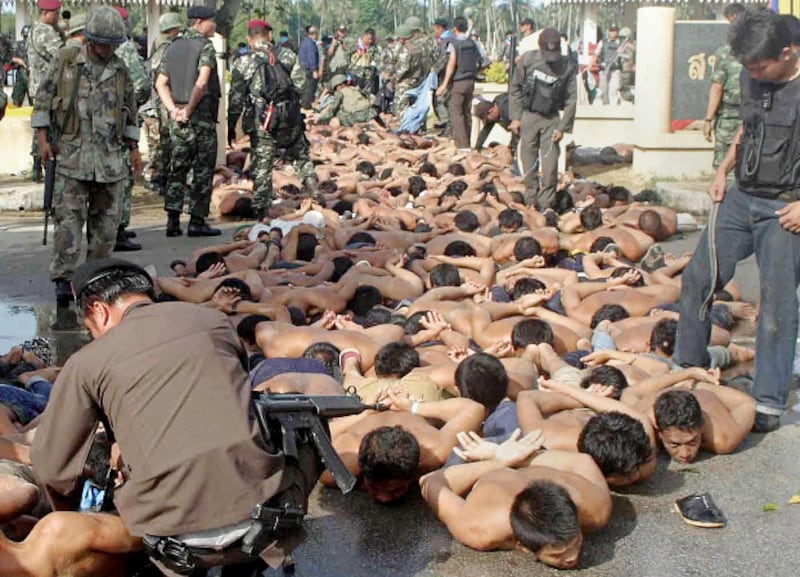Updated at 9:15 a.m. ET on 2015-10-23
Eleven years after 85 protesters died in the Tak Bai incident that helped re-ignite an insurgency in Thailand’s Deep South, relatives of victims say Thai authorities often urge them to forget about it – and ask if they have done so.
“For those unaffected by the incident, it is easy to say dead is dead and it is over. But for their families, no matter how long it is, they cannot forget,” said Yaena Salaemae, the mother of a man detained during the incident in Narathiwat province’s Tak Bai district on Oct. 25, 2004.
“If anyone tries to address the issue again, the military asks them what doubts they still have as the case should be over,” she told BenarNews during an interview there on Thursday.
Sunday marks the 11th anniversary of a protest outside a police station in Tak Bai, which turned into a tragedy that remains seared in the minds of residents of the predominantly Muslim, Malay-speaking region.
Even today, the Thai military asks suspected rebels who have been captured whether they were involved in the incident 11 years ago, Yaena said.
“In every arrest, there will be a question about whether they took part in the Tak Bai incident. And if one is found with a record, their detention will be extended from seven days to a month,” she said.
A pivotal year

Demonstrators lie on the pavement after their arrest oustide Tak Bai police station in Narathiwat province, Thailand, Oct. 25, 2004. [AFP]
On that day in October 2004, some 2,000 people gathered at a playground opposite the police station to protest the detention of six local volunteer security guards, who were accused of supplying southern rebels with stolen government-issued weapons.
According to accounts, seven demonstrators were killed when authorities opened fire on the crowd. Then, after police and soldiers rounded up and arrested scores of other protestors, another 78 died of suffocation while being taken away in trucks to a military camp 150 km (93.2 miles) away in Pattani province, according to official autopsies.
The incident occurred six months after 32 suspected insurgents were killed when Thai security forces stormed the Krue Se Mosque in Pattani, where rebels were hiding out.
These two events re-ignited a separatist insurgency that started in the 1960s but had simmered down. Since 2004, more than 6,000 people have been killed in violence associated with the insurgency.
Eleven years on, there is no end in sight to the conflict although Thailand’s military-controlled government has been trying to persuade southern rebel groups to re-open formal peace talks.
Not pursuing perpetrators
For Deep South residents, the scars of Tak Bai endure.
“Some officials keep asking villagers about how they still feel about the incident, which, in turn, reminds them of their grief. They keep asking if anyone still don’t forget it yet,” Yaena Salaemae said.
“But I think they’d better not ask at all, if they want this incident to be forgotten for good. They should stop accusing the residents of being bad elements. They rallied to only demand the release of the village defense volunteers, and they did not mean to hurt anyone,” Yaena said.
Yaena, who owns a grocery store in Tak Bai, led relatives of the 85 dead in negotiating a financial package with the government to compensate them for the loss of their loved ones. The families of the dead each got 7.5 million baht (U.S.$210,000).
The injured were paid one to 7.5 million baht (U.S.$28,209 - $210,000) while those detained received 30,000 baht ($846) in compensation. Fifty-eight detainees were released two years later.
“My life now is better,” Marigi Doloh, who was injured in the incident, told BenarNews. “And I live my life according to religious teachings. I listen to sermons and go fishing if I have time.”
“I want to forget it,” he added.
None of the police officers or soldiers who were involved in the shootings and arrests were ever charged or prosecuted for the 85 deaths. But Yaena and relatives of victims believe it isn’t worth the time and effort to try to bring to justice those who were responsible, she said.
“Everyone doesn’t want to sue the government due to length of the court procedures, the language barrier and the traveling. Everything is over now,” she said.
‘It was well planned’
A Thai official who has spent 25 years in the Deep South said local people were convinced police had framed the six volunteers, and could not be persuaded otherwise.
“They didn’t listen to our explanation but accused us of distorting facts,” said the official, who asked not to be named.
The Barisan Revolusi Nasional Melayu Patani (BRN), one of the main rebel groups, played a role in exacerbating tensions that day by enlisting students from Islamic schools in the area to join the protest outside the police station, he went on to say.
“It was not a coincidence but it was well planned. I doubt if a man like Sapae-ing Basoh, who knew this well, would come out to tell the truth,” the official added, referring to a former principal of Thammawittaya Foundation School, who now lives in exile in Malaysia and is believed to be the BRN’s de facto leader.
Every year during Tak Bai commemorations, the official said, locals “only point the finger at the government” rather than educating people to stay away from violence and prevent such a tragedy from happening again.
“No one wanted this mishap to take place,” he said.
An earlier version of this story incorrectly stated that Yaena Salamae's son died in the Tak Bai incident.
